
Sustainable Development Goals
After the moderate success of the UN’s Millennium Development Goals, countries around the world committed to achieving the even more ambitious Sustainable Development Goals (SDGs). US commitment to provide foreign aid to solve world problems has remained steady over the last few decades, and continues to be the highest among donor nations in absolute terms, though relatively low in terms of a percentage of GDP.
- National Sample: 2,417 registered voters
- Margin of Error: +/- 2.0%
- Fielded: October 22 - 30, 2019
- Questionnaire
Proposals covered:
- Increasing foreign aid to provide universal access to vaccines
- Increasing foreign aid to eliminate chronic hunger
- Increasing foreign aid to provide universal access to clean drinking water and sanitation
Respondents were given a briefing about the UN SDGs, that went as follows:
As you may know in 2000, all of the member countries of the United Nations (including the US), plus international agencies and international non-profit aid organizations came together and agreed on a set of worldwide goals to achieve by 2015. This included goals of:
- lowering the number of people in extreme poverty
- reducing hunger
- providing access to healthcare
- ensuring education for all children
and others. These were known as the Millennium Development Goals. Some of these goals were achieved. Most notable, the number of people living in extreme poverty was cut in half. But other goals were not fully met. In 2015, another set of goals was developed with the aim of achieving them by 2030. These are known as the Sustainable Development Goals.
They then evaluated three pairs of arguments for and against the US increasing its foreign aid, in order to solve global problems. All arguments were found convincing by a majority. The pro arguments did much better among Democrats, and the con arguments much better among Republicans. For all arguments except one, about eight in ten from one party found it convincing, while just around half or less from the other party did. The only argument to get robust bipartisan support included facts about the outcomes of foreign aid -- in saving and improving lives.
The first pro argument spoke to the ‘moral obligation’ the US has to improve the lives of the disadvantaged around the world, and how relatively little the US contributes relative to most other developed countries. Around six in ten found this convincing, including eight in ten Democrats. Just 36% of Republicans were convinced.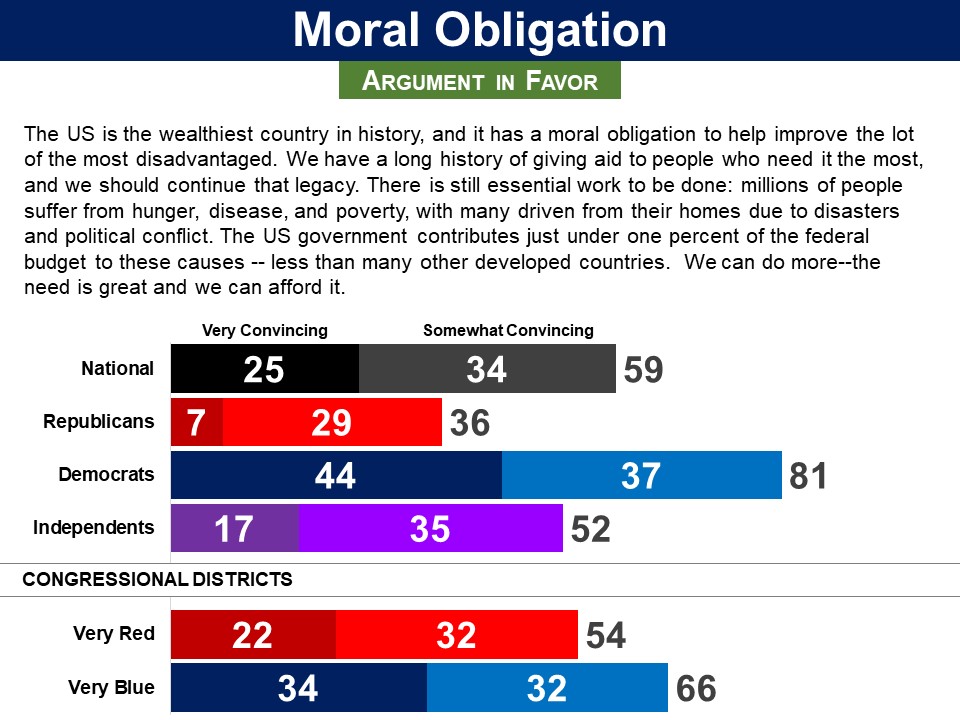 The first con argument spoke to the ‘moral obligation’ the US has to improve the lives of US citizens first and foremost, and how many expensive problems the US is currently facing. This was found convincing by seven in ten, including 88% of Republicans. A bare majority of Democrats (52%) felt the same.
The first con argument spoke to the ‘moral obligation’ the US has to improve the lives of US citizens first and foremost, and how many expensive problems the US is currently facing. This was found convincing by seven in ten, including 88% of Republicans. A bare majority of Democrats (52%) felt the same.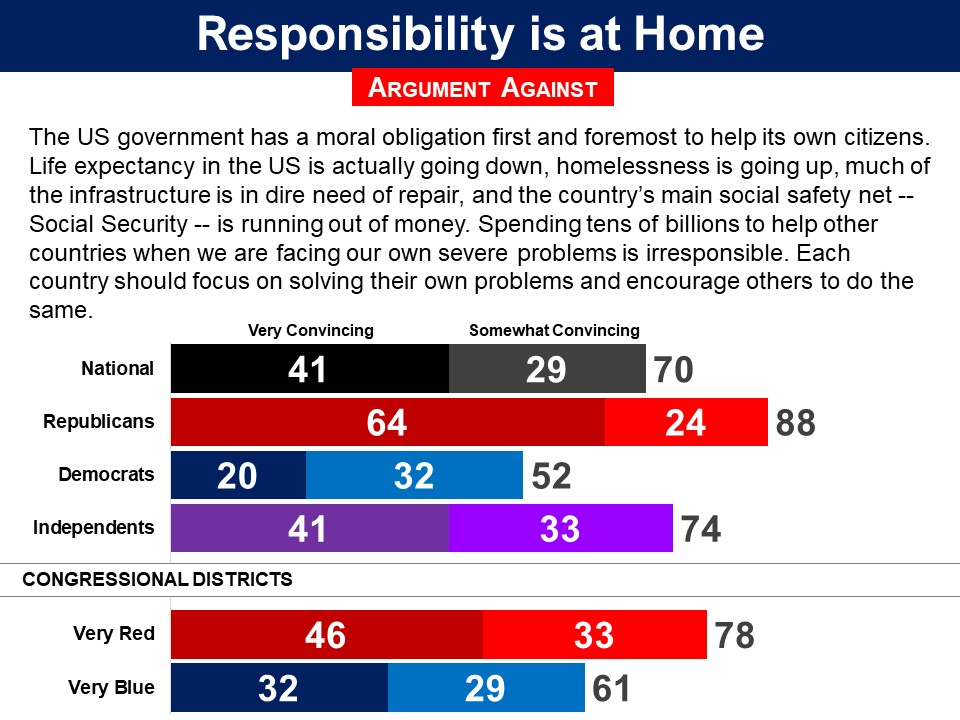 The next pro argument underscored how improvements in other parts of the world are an ‘investment in the future’ that help the US in the long run, by expanding markets and increasing stability. Seven in ten found this convincing, including 86% of Democrats. Republicans were split with 51% convinced.
The next pro argument underscored how improvements in other parts of the world are an ‘investment in the future’ that help the US in the long run, by expanding markets and increasing stability. Seven in ten found this convincing, including 86% of Democrats. Republicans were split with 51% convinced.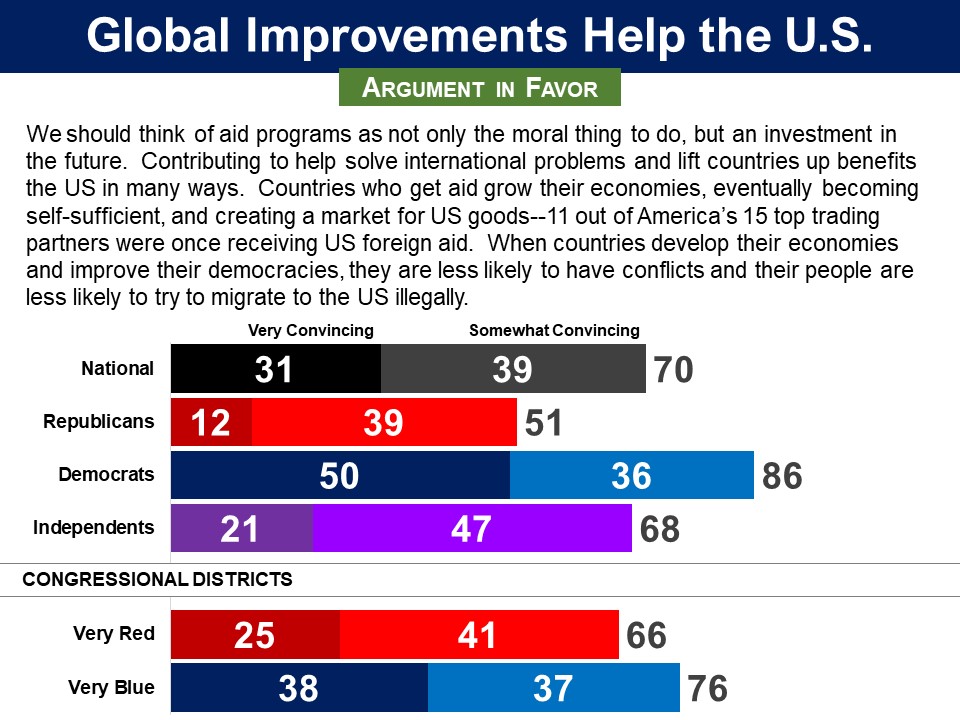 The next con argument stressed that aid is not very effective, and that it can be pocketed by foreign officials, and that before countries get aid they need to ‘clean up their act’. This was found convincing by seven in ten, including nearly nine in ten Republicans. A slight majority of Democrats agreed with 52% convinced.
The next con argument stressed that aid is not very effective, and that it can be pocketed by foreign officials, and that before countries get aid they need to ‘clean up their act’. This was found convincing by seven in ten, including nearly nine in ten Republicans. A slight majority of Democrats agreed with 52% convinced.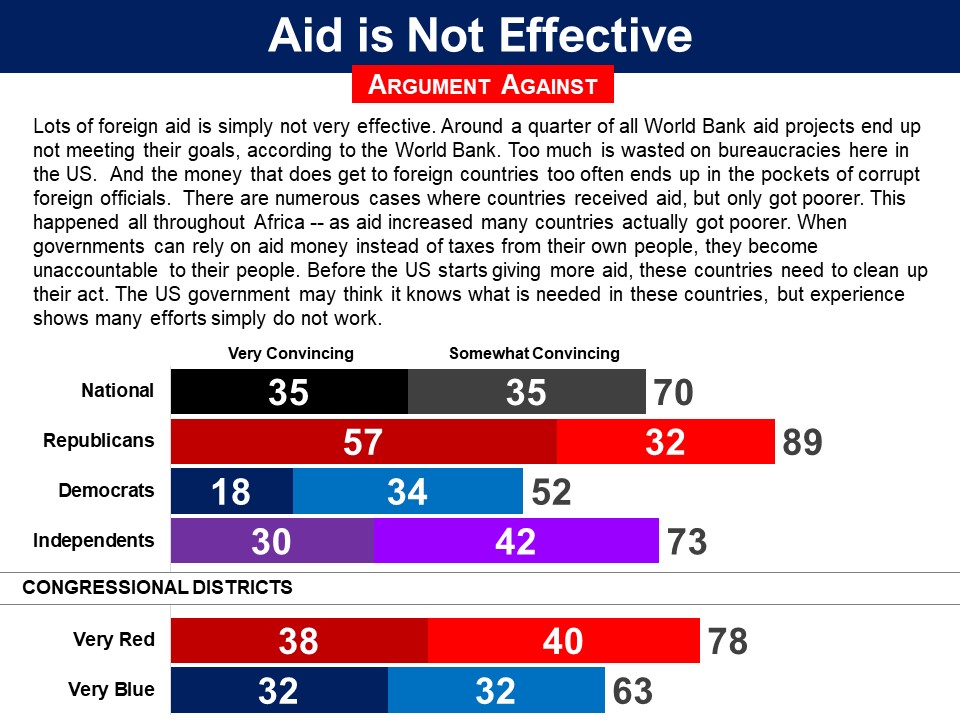 The last pro argument highlighted the positive impact of aid throughout the last few decades, from lives saved to children educated. Three in four found this convincing, including six in ten Republicans and nearly nine in ten Democrats.
The last pro argument highlighted the positive impact of aid throughout the last few decades, from lives saved to children educated. Three in four found this convincing, including six in ten Republicans and nearly nine in ten Democrats.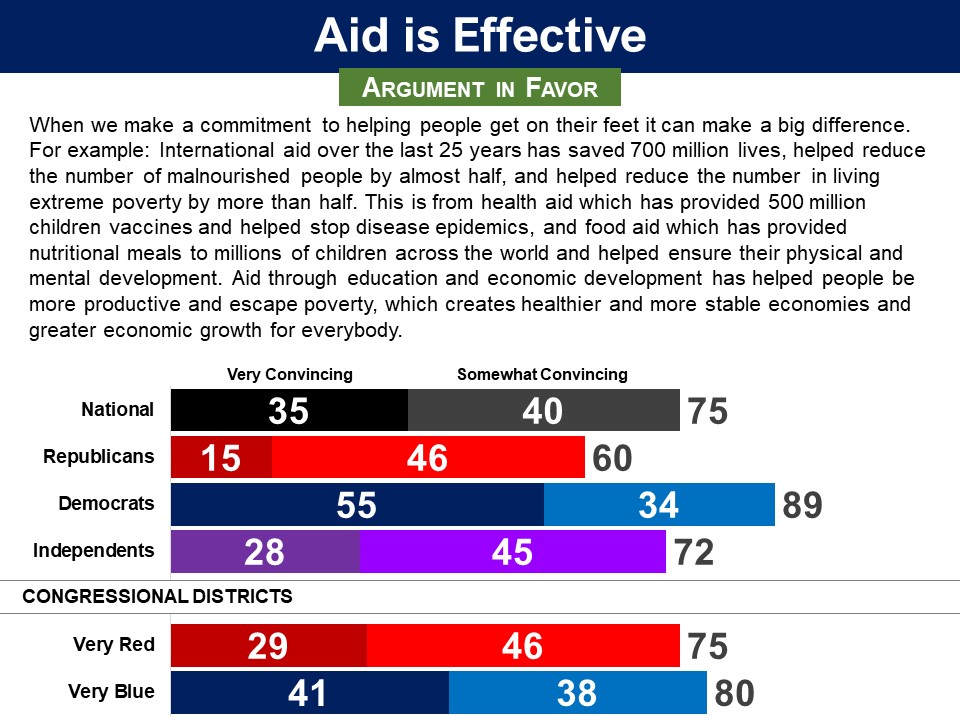 The last argument emphasized the point that aid can create dependency, can make governments unaccountable when they no longer need to rely on their own citizens, and can hurt local producers. This was found convincing by six in ten, including 83% of Republicans. Just 36% of Democrats concurred.
The last argument emphasized the point that aid can create dependency, can make governments unaccountable when they no longer need to rely on their own citizens, and can hurt local producers. This was found convincing by six in ten, including 83% of Republicans. Just 36% of Democrats concurred. 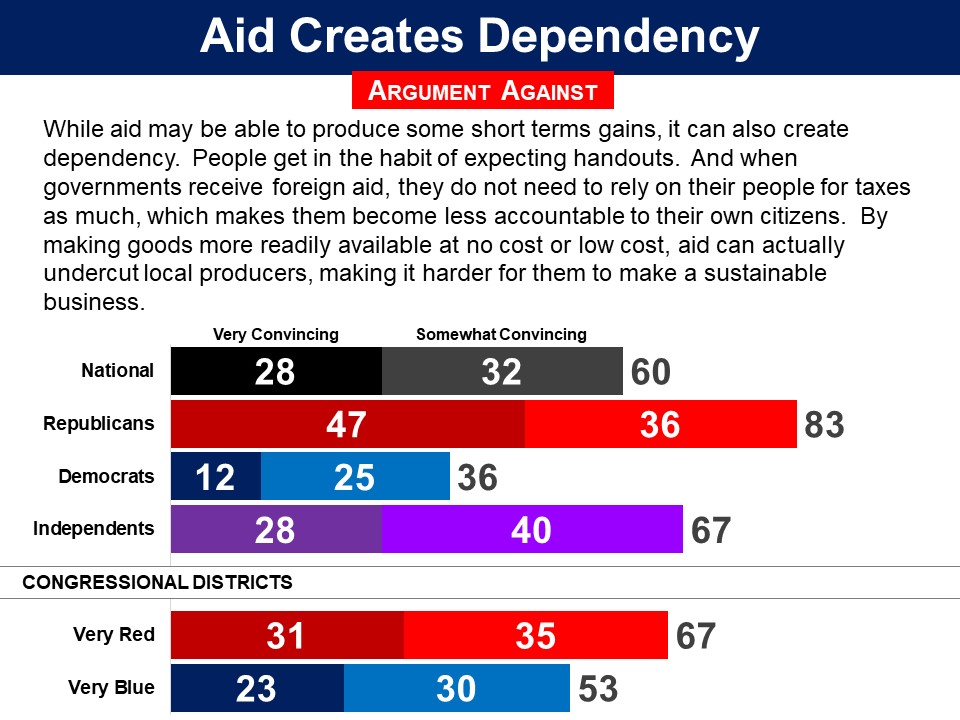 After evaluating arguments for and against increasing US foreign aid, respondents evaluated five SDGs. For each, they were told about the problem in need of solving, how much was needed to achieve the SDG, what the US’ share would be, and how much this would increase their taxes. It went as follows:
After evaluating arguments for and against increasing US foreign aid, respondents evaluated five SDGs. For each, they were told about the problem in need of solving, how much was needed to achieve the SDG, what the US’ share would be, and how much this would increase their taxes. It went as follows:
We are now going to explore what needs to be done to meet these Sustainable Development goals, primarily for people in poor countries. In each case, there are steps that the governments in those low-income countries need to take. There are also steps that businesses need to take to invest in those low-income countries.
But, a critical element is additional aid that would be needed from the high-income countries. All of the high-income countries, including the US, participated in setting these goals. Since the goals were set, estimates were done to establish how much it would cost to meet these goals. So, the question now is whether the high-income countries will commit to contributing the necessary additional funds to meet the goals.
A proposed framework is to have all high-income countries contribute the same amount in terms of the percentage of their economy. That means the countries with larger economies would pay more. But all would be paying the same percentage of their economies. For each goal we will tell you the estimate for how much additional aid will be required to meet that goal and what the US share would be, based on the size of its economy compared to the other high-income countries.
There are various ways that the US could raise the necessary funds including increasing the US debt, cutting spending or raising taxes. For the sake of this exercise we will assume that the funds would be raised by increasing all Federal taxes equally (except those committed to Social Security and Medicare). This would include the amount of Federal income taxes you pay. So, say that to meet a certain goal, the total of US taxes would need to go up 1%. This means that the total of your income taxes would go up 1%. So, say your income taxes are $5,000 a year. A 1% increase would mean that you would pay an extra $50 per year.
For each SDG, they could choose whether, “if other countries would be willing to contribute their part”, the US should contribute its fair share. If not, they could choose whether the US should contribute half it’s fair share.
SUSTAINABLE DEVELOPMENT GOALS |
|
|
Provided that the other donor nations contribute their proportionate share of the costs of meeting the various SDGs, the US should contribute its fair share by: |
|
There has been a concern that access to vaccines across the world is inadequate. To address this concern, the UN has created the SDG of universal access to vaccines. Respondents were presented: Another key challenge is ensuring that every person gets the necessary vaccines, especially children. Every year, millions of people die from diseases that could have been prevented by vaccinations. In 2017, about 20 million children did not receive regular life-saving vaccinations. Addressing this challenge requires providing communities with a steady supply of vaccines, getting doctors to areas that need them, and training new healthcare workers. The World Health Organization estimates that to provide universal access to vaccines will cost an additional $28 billion a year for ten years. They estimate that this could prevent the deaths of around 10 million people. The US share of this amount would be about $11 billion. This would require the total of US Federal taxes going up about 0.5%, which means your Federal taxes would go up by 0.5% as well. Finally, asked whether the US should be willing to contribute an additional $11 billion to provide universal access to vaccines, if other countries contribute their fair share, seven in ten said the US should, including 87% of Democrats and 51% of Republicans. Those who opposed were asked whether the US should be willing to contribute half its fair share. Taking into account those willing to contribute the full share, 77% recommended the US contribute at least half its fair share, or $5.5 billion a year, including 92% of Democrats and 62% of Republicans. Related Standard Polls
|
|
There has been a concern that not enough people are getting an adequate amount of food on a daily basis. To address this concern, the UN has created the SDG of eliminating chronic hunger Respondents were presented: One key goal is to eliminate chronic hunger. Chronic hunger means that people do not have enough food on a long term and persistent basis. It does not refer to hunger that might result from a natural disaster or an outbreak of a civil conflict. The UN estimates that about 815 million people, or about 11% of the world’s population, are suffering from chronic hunger. This number has been going down in recent decades--in 1990 about one billion people suffered from chronic hunger. Still, each year about 9 million people die as a result of starvation or hunger-related diseases. Addressing this challenge requires not only providing food directly, but helping to provide farmers with water, access to markets, agricultural equipment, and training in farming methods. The UN estimates that eliminating nearly all chronic hunger by 2030 would require an additional $93 billion a year until 2030. This would be for providing food and agricultural development, in addition to other anti-poverty programs. This would mean that 9 million fewer people would die each year. The US share of this amount would be about $36 billion. This would require the total of US Federal taxes going up about 1.7%, which means your Federal taxes would go up by 1.7% as well. Finally, asked whether the US should be willing to contribute an additional $36 billion to eliminate chronic hunger, if other countries contribute their fair share, two thirds said the US should, including 87% of Democrats, but just 43% of Republicans. Those who opposed were asked whether the US should be willing to contribute half its fair share. Taking into account those willing to contribute the full share, more than seven in ten recommended the US contribute at least half its fair share, or $18 billion a year, including 91% of Democrats and 53% of Republicans. Related Standard Polls
|
|
There has been a concern that access to clean drinking water sanitary toilets around the world is inadequate. To address this concern, the UN has created the SDG of universal access to those necessities. Respondents were presented: Another key goal is ensuring access to clean water and a sanitary sewage system. According to the UN’s World Health Organization, 844 million people lack access to clean water, and 4.5 billion people lack a sanitary sewage system. As a result, people living in these conditions suffer from resulting infections. This results in illness and reduces their ability to work, thus reducing their incomes. Approximately 500,000 people die each year from illnesses due to lack of clean water and sanitary sewage systems. Addressing this challenge requires building dams, water treatment plants, water lines, and sewage systems to purify and distribute water, and to dispose of human waste. The World Bank estimates that to provide universal access to clean water and sanitary sewage systems would require new commitments of additional $107 billion a year. This would mean that 500,000 fewer people would die each year. The US share of this amount would be about $42 billion. This would require the total of US Federal taxes going up about 1.9%, which means your Federal taxes would go up by 1.9% as well. Finally, asked whether the US should be willing to contribute an additional $42 billion to provide universal access to clean water and sanitary sewage systems, if other countries contribute their fair share, six in ten said the US should, including 83% of Democrats, but just 40% of Republicans. Those who opposed were asked whether the US should be willing to contribute half its fair share. Taking into account those willing to contribute the full share, or $21 billion a year, seven in ten recommended the US contribute at least half its fair share, including 89% of Democrats and 51% of Republicans. Related Standard Polls
|
|
There has been concern over the state of democracy and human rights around the world, which has sparked debate over if the US should promote these causes in other countries, and if so, then by what means. Respondents were presented with the following briefing material as part of an in-person deliberation hosted by Stanford University’s Center for Deliberative Democracy in September 2019: One key American foreign policy issue is whether the US should defend human rights and support democratic institutions and groups in other countries. “Realists” say that our foreign policy and military deployments should serve our national interests in making America more secure and prosperous. Therefore, we should ignore human rights abuses in authoritarian countries like Russia, China, North Korea, Saudi Arabia and Egypt, and instead advance our economic welfare, control weapons proliferation, help allies like Israel, and find ways to work with other countries on issues such as terrorism. On the other hand, “idealist” critics point out that America’s greatest rivals are dictatorships; that no two democracies have ever gone to war with one another; and that the democracies of the world have been our most reliable allies and trading partners. In this view, America’s national interests are best served through the peaceful spread and defense of democracy and its ideals and practices. In fact, strong bipartisan support exists in Congress for peaceful assistance programs to help other countries develop democracy’s core institutions. Currently the US spends about $2 billion per year on these efforts, which is less than one-tenth of one percent of the total federal budget. The current question is how much should the US emphasize democracy and human rights in its diplomacy — and should democracy be a prerequisite for US economic and military assistance to other countries, which now totals nearly $50 billion? Realists counter that larger priorities exist when dealing with adversaries like China and Russia, and that criticizing partners for poor human rights records could make them less cooperative in the War on Terror or American efforts to counter Iran, Russia, or China. Human rights advocates say that the US should use its voice in world affairs to defend the freedoms of speech, organization, religion and other principles that have made America a great nation. Therefore, we should condemn violations of these rights even among friendly governments or powerful adversaries, and we should consider how well countries adhere to democracy and the rule of law when allocating foreign aid. They were presented with a proposal and arguments for and against it, as follows: Proposal: The US should use diplomacy and financial support to promote democracy and human rights throughout the world. Argument in Favor: Democracies share values and interests with the US, and democracies do not fight one another. All of the countries threatening our security are nondemocracies. Promoting democracy and human rights abroad will produce more democracies, new allies, and fewer threats. This will serve America’s national interests. Argument Against: The US should not interfere in the domestic politics of other countries, just as they should not intervene in American politics. This should be true even when foreign governments pursue policies that offend us. We should focus on building alliances with any country that can help advance US national interests, including dictatorships. After receiving the briefing material, respondents deliberated on the proposal in-person. Finally, they were asked for their final recommendation. On a ten-point scale, 72% favored (6-10) the US using diplomacy and financial support to promote democracy and human rights abroad. This included 62% of Republicans and 83% of Democrats. Related Standard Polls
Large bipartisan majorities favor the US using diplomacy to promote democracy and human rights abroad:
|





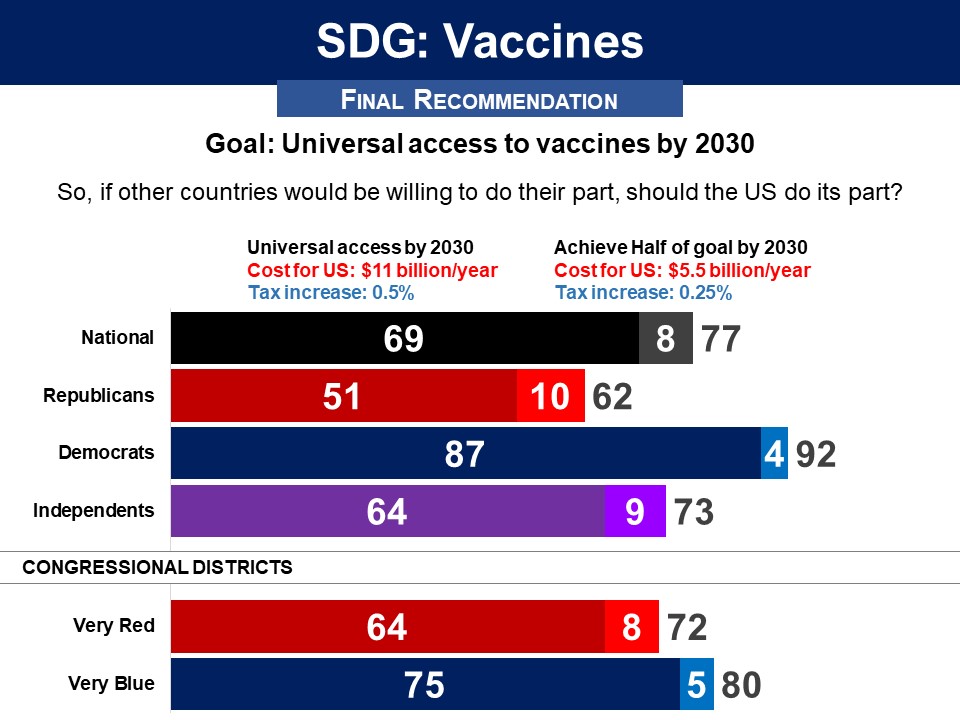
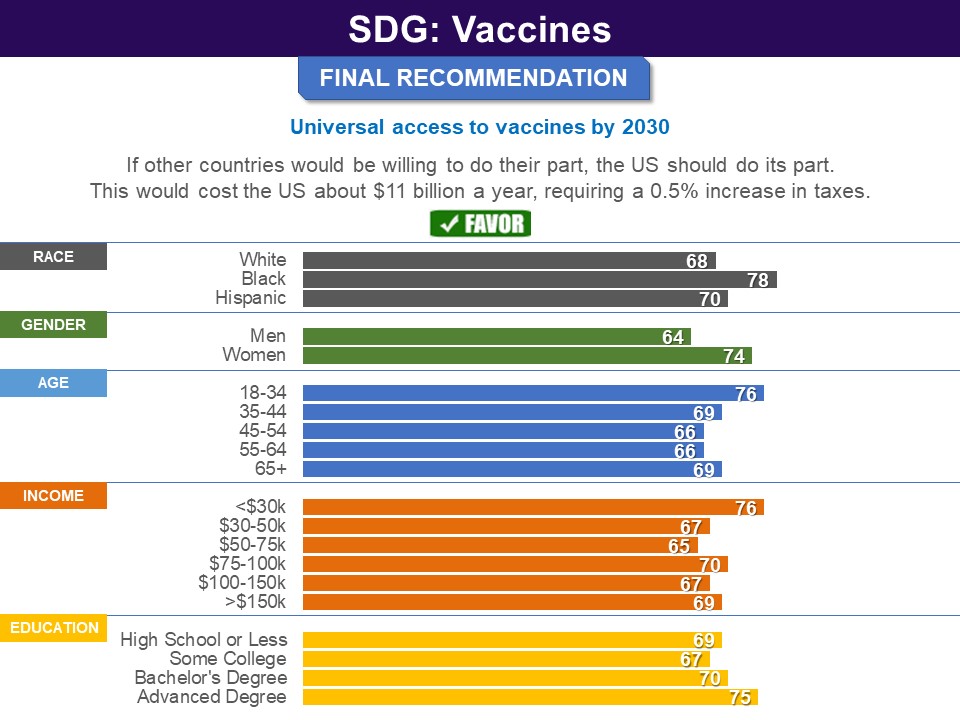 A poll conducted in March 2020, in which respondents were given the same information about SDGs and asked to evaluate the same proposals, but did not evaluate arguments, found very similar results nationally, and among both parties.
A poll conducted in March 2020, in which respondents were given the same information about SDGs and asked to evaluate the same proposals, but did not evaluate arguments, found very similar results nationally, and among both parties.


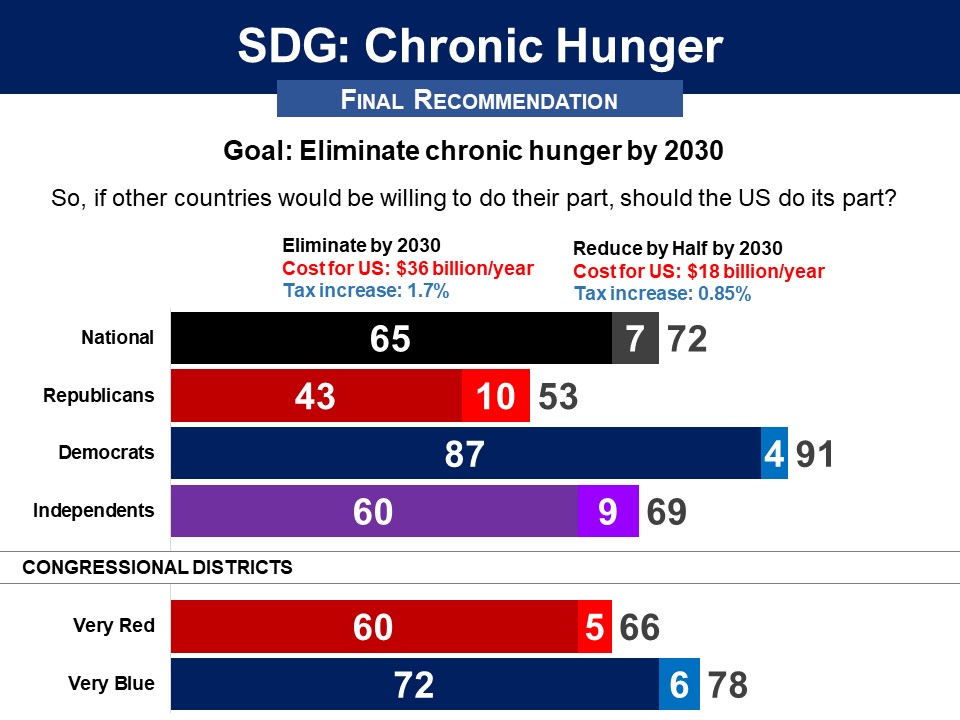
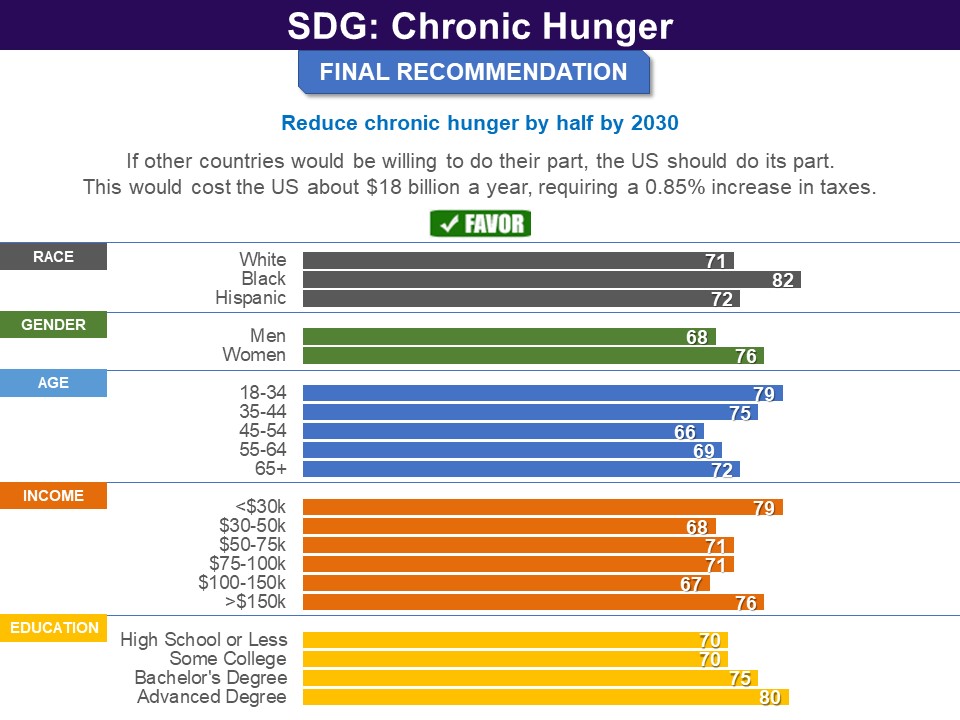 A poll conducted in March 2020, in which respondents were given the same information about SDGs and asked to evaluate the same proposals, but did not evaluate arguments, found slightly less support nationally, and among both parties.
A poll conducted in March 2020, in which respondents were given the same information about SDGs and asked to evaluate the same proposals, but did not evaluate arguments, found slightly less support nationally, and among both parties.

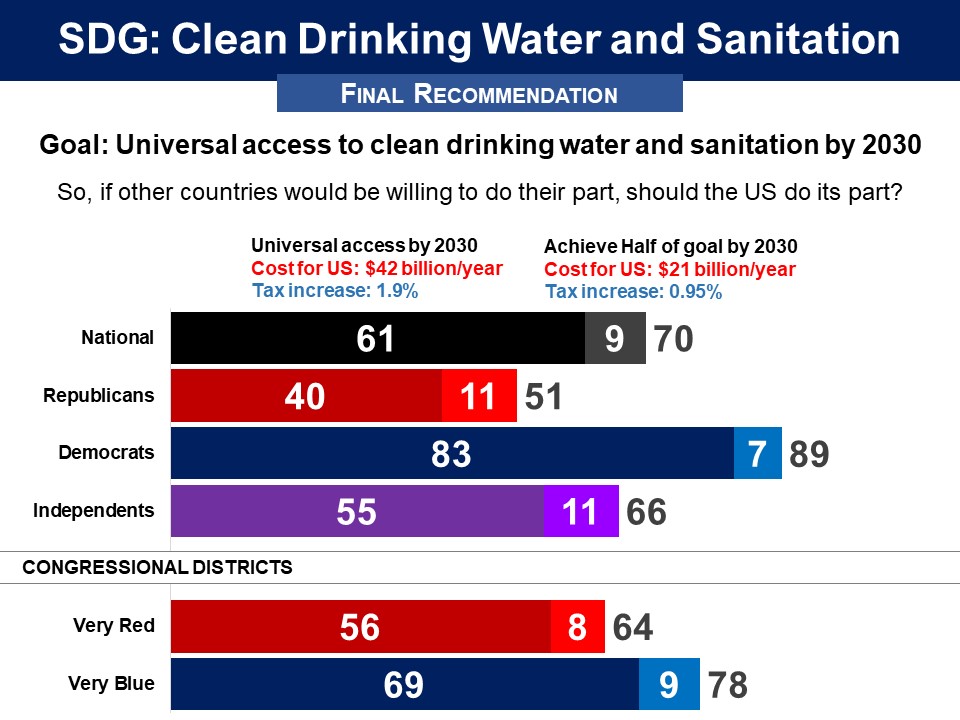
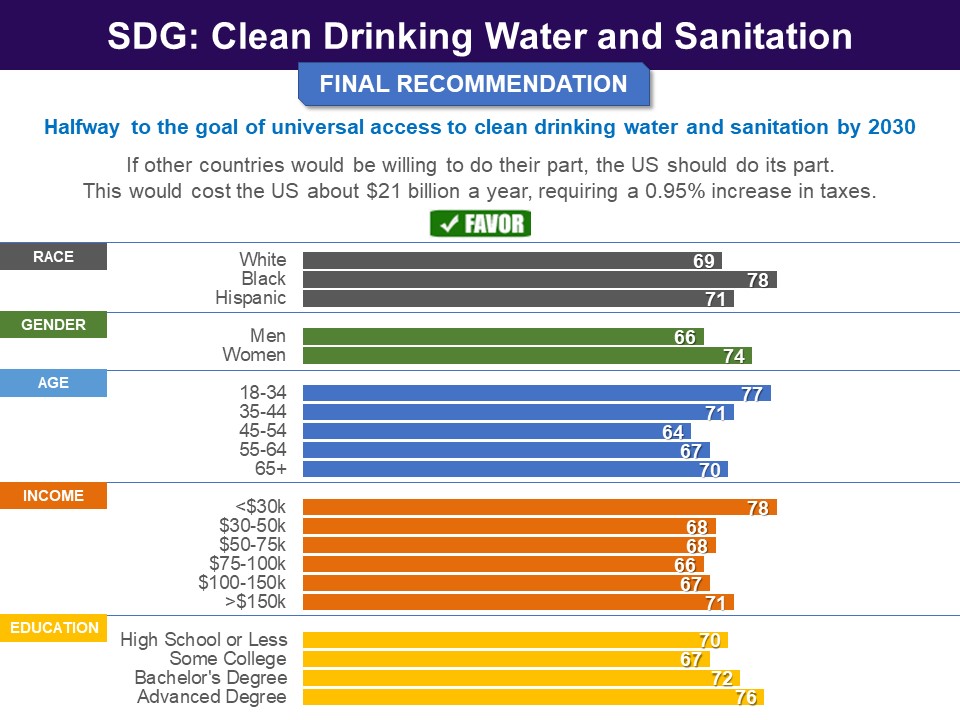 A poll conducted in March 2020, in which respondents were given the same information about SDGs and asked to evaluate the same proposals, but did not evaluate arguments, found very similar results nationally, and among both parties.
A poll conducted in March 2020, in which respondents were given the same information about SDGs and asked to evaluate the same proposals, but did not evaluate arguments, found very similar results nationally, and among both parties.

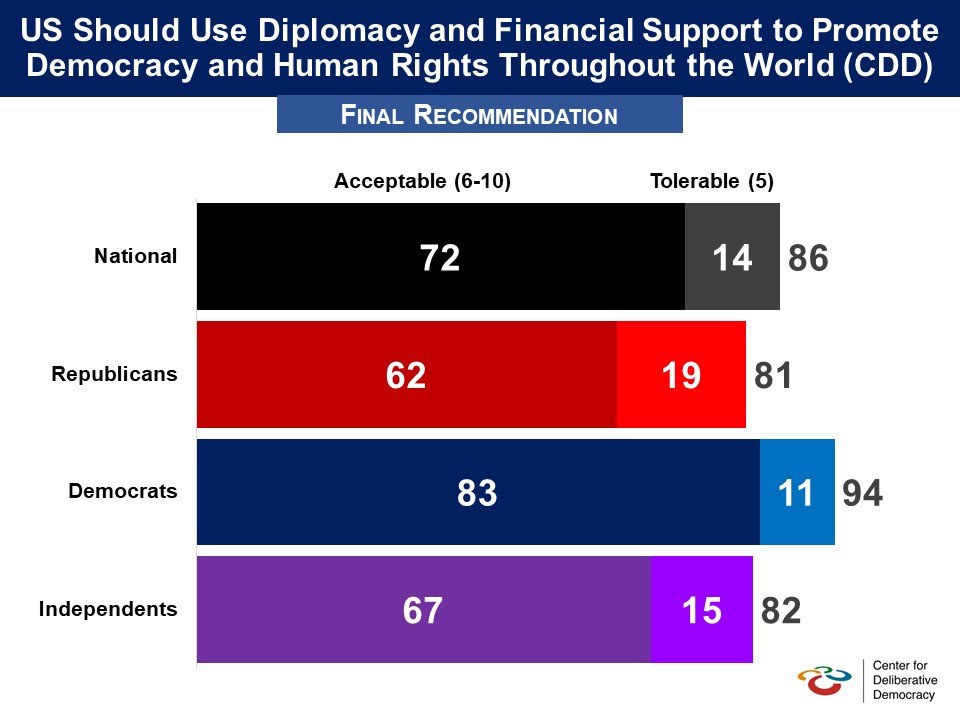 Pre-Deliberation Poll
Pre-Deliberation Poll